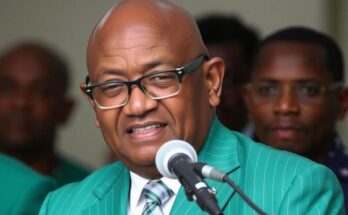The 2024 elections in Southern Africa signal a potential shift in political dynamics, particularly in South Africa where the ANC lost its majority. The emergence of opposition parties indicates growing public demand for change, driven by socioeconomic grievances across the region. Botswana experienced a notable change with the UDC gaining power amid economic dissatisfaction, while tensions persist in Mozambique and Namibia reflects a resistance to the long-standing hold of liberation movements. Collectively, these developments highlight the electorate’s increasing expectations for reform and accountability.
The electoral landscape in Southern Africa is undergoing significant transformations as evidenced by the results of the 2024 elections in South Africa, Mozambique, Botswana, and Namibia. These elections indicate unique trajectories distinct from the unified narrative of change often presented in the region. Particularly noteworthy is the ruling African National Congress (ANC) in South Africa, which has lost its majority for the first time, necessitating the formation of a coalition government. The implications of this shift point towards a potential transition away from the dominance of liberation movements that have shaped regional politics since independence.
The ANC’s decline can be partially attributed to dissatisfaction among various social groups, compounded by the entrance of competitive political factions, such as those aligned with former President Jacob Zuma, who managed to garner support from struggling populations. Analysts suggest that the themes surrounding Zuma’s political resurgence evoke comparisons to populist movements elsewhere, posing questions about the future of traditional parties in South Africa.
In Botswana, the recent elections saw a historic change with the opposition Umbrella for Democratic Change (UDC) taking parliamentary majority, signaling significant discontent among voters primarily driven by economic issues. Duma Boko, a prominent opposition leader, articulated the moment as a pivotal advancement for democracy. Botswana’s transition is particularly significant given its background as a stable nation that has experienced economic challenges, especially with a downturn in its diamond-dependent economy. The newly elected government faces the pressing responsibility to address high unemployment and the rising cost of living, focusing on diversifying the economy beyond resource dependency.
Mozambique’s political landscape remains fraught with challenges as the ruling Frente de Libertação de Moçambique (Frelimo) maintains power amid severe allegations of electoral fraud and violence. The opposition led by Mondlane has voiced demands for reform, echoing the sentiments of urban populations disenchanted with the status quo. These rising social tensions point to a broader call for change within a framework dominated by historical grievances, corruption, and economic instability.
Finally, Namibia’s November elections appear to reinforce existing political structures with the SWAPO party securing another term, albeit under the leadership of Netumbo Nandi-Ndaitwah, which introduced a notable demographic shift in leadership representation. Despite claims of technical issues during the electoral process, the party’s long-held dominance remains largely intact, reflecting the complexities of voter expectations in the face of historical stability versus the aspirations for reform.
This pattern across Southern African nations underscores a common theme: the growing aspirations for economic development and political accountability amongst younger electorates. The evolving dynamics challenge the long-held narratives of liberation movements and necessitate a re-evaluation of strategies to engage with an increasingly vocal citizenry demanding substantive change.
The political landscape of Southern Africa is currently experiencing shifts as the region prepares for the 2024 elections. Historical liberation movements that once dominated the political arena are facing declining support amidst growing public discontent related to socioeconomic issues, governance failures, and corruption. Analyzing the recent elections in South Africa, Mozambique, Botswana, and Namibia reveals an emerging need for political renewal and accountability in a region once characterized by strong adherence to liberation narratives. As such, the electoral outcomes across these nations indicate a compelling desire among voters, particularly younger generations, to hold governing bodies accountable and demand transformative socio-economic policies.
The recent electoral results in Southern Africa, particularly in South Africa, Botswana, Mozambique, and Namibia, illustrate a regional shift towards a burgeoning demand for political and economic transformation. The decline of long-standing liberation movements such as the ANC and Frelimo reflects the electorate’s growing frustration with institutional failures and economic marginalization. As opposition parties gain traction and new leaders emerge, it is evident that the historical narratives of liberation no longer resonate as powerfully with the populace. The implications suggest a critical juncture for ruling parties to adapt and deliver effectively on the expectations of their constituents, or risk facing significant political consequences.
Original Source: www.fairobserver.com




